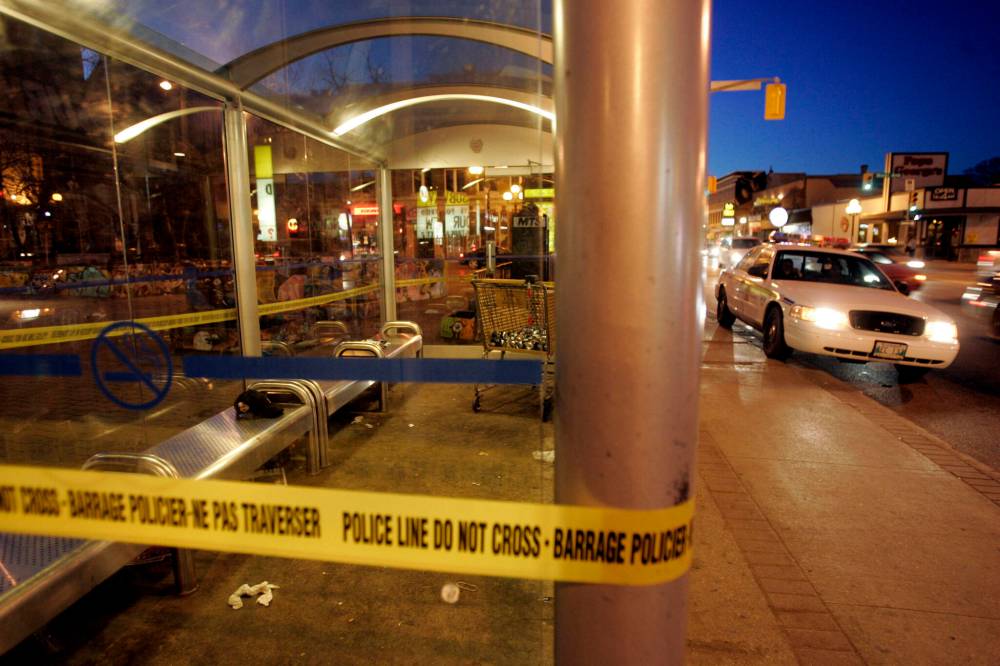Redefining what downtown safety means
Advertisement
Read this article for free:
or
Already have an account? Log in here »
To continue reading, please subscribe:
Monthly Digital Subscription
$0 for the first 4 weeks*
- Enjoy unlimited reading on winnipegfreepress.com
- Read the E-Edition, our digital replica newspaper
- Access News Break, our award-winning app
- Play interactive puzzles
*No charge for 4 weeks then price increases to the regular rate of $19.00 plus GST every four weeks. Offer available to new and qualified returning subscribers only. Cancel any time.
Monthly Digital Subscription
$4.75/week*
- Enjoy unlimited reading on winnipegfreepress.com
- Read the E-Edition, our digital replica newspaper
- Access News Break, our award-winning app
- Play interactive puzzles
*Billed as $19 plus GST every four weeks. Cancel any time.
To continue reading, please subscribe:
Add Free Press access to your Brandon Sun subscription for only an additional
$1 for the first 4 weeks*
*Your next subscription payment will increase by $1.00 and you will be charged $16.99 plus GST for four weeks. After four weeks, your payment will increase to $23.99 plus GST every four weeks.
Read unlimited articles for free today:
or
Already have an account? Log in here »
Hey there, time traveller!
This article was published 20/10/2022 (1146 days ago), so information in it may no longer be current.
With municipal elections right around the corner, the topic of safety in downtown Winnipeg is once again centre stage. It seems everyone has something to say about it — academics, pundits, electoral candidates. And they are all working from the same list: Crime. Fear. Houselessness. Addiction. Mental illness. Bus shelters.
The list seems endless and overwhelming.
As a front-line organization dealing with all these issues every day, the Downtown Community Safety Partnership (DCSP) thinks readers deserve to hear about them straight from the horse’s mouth. And we want to be clear that ours is a message of hope: these problems can be worked, tackled and even solved. We know this because we help solve them every day, step by step.

WAYNE GLOWACKI / WINNIPEG FREE PRESS FILES
Safety in Winnipeg’s downtown has been identified as a priority issue in surveys leading up to next week’s civic election.
Our downtown is important because when someone thinks about a city, any city, their thoughts don’t turn to suburban roads and houses. We think first of that city’s beautiful skylines, its tall buildings and the boundless opportunities that lie in wait there. Winnipeg is no exception.
But we can only access those opportunities, whether for fun or business, if we feel safe and comfortable. And this is true for everyone, whether they’re catching a game or a concert, dining out, or needing to access key resources such as housing, detox or mental health support.
If we are to start taking safety seriously in our downtown, we need to recognize that — at the risk of belabouring a popular pandemic slogan — we’re all in this together. We cannot exclude the marginalized, historically excluded and at-risk populations in conversations about downtown safety.
This is where the DCSP comes in. When the insidious silence of the pandemic gripped downtown and its familiar social problems swelled in size, the province of Manitoba, the city of Winnipeg, Downtown BIZ and True North decided that our downtown community mattered too much to leave behind. Change was sorely needed.
In 2020, an agreement was reached to form the DCSP as a non-profit organization; within the year, our operations were running 24/7.
You may have seen us in the news, or our friendly staff, dressed in bright green, walking the downtown area. Our mission is to make downtown a safer place for everyone — anyone who works, lives, and/or enjoys our downtown. We do this through the efforts of a diverse staff that reflects the community we serve.
Our model centres around reaching out and connecting with those in need. Our philosophy is based on a continuum of care, and we continue to engage with and visit our participants (our name for the people we serve) long after our first encounter with them.
The work we do is only possible with the support of community partners and a collaborative, whole-community approach. In that pursuit, we work very closely with area shelters, clinics, hospitals and emergency services to provide the necessary resources and support to our participants.
A typical workday for us might include providing someone with directions to a restaurant, walking through back alleys and parking lots, and doing a wellness check on someone sleeping in a bus shelter and connecting them with resources for detox or housing.
Our teams work diligently, navigating systems such as mental health supports, criminal justice and shelter networks to ensure nobody falls through the cracks. And through data made available by our partners at the Winnipeg Fire Paramedic Service, we’ve learned the more we engage the downtown population, the fewer non-emergency calls paramedics and first responders receive.
This frees them up to do the important, lifesaving work they need to do elsewhere.
While we love this work and have made great progress over the past two years, we can’t do it alone. Elected officials, voters and policymakers all need to play their part in joining the conversation and redefining “safety” so it includes all of us.
This means expanding affordable housing and shelter space so we can make sure nobody is left out in the cold (literally and figuratively). It means providing more beds for those struggling with addictions and mental illness so we can help individuals start their journeys to recovery.
If we are to build a safer downtown for everyone, we all need to participate. We hope you will join us in this work, whether it’s with a vote for a candidate you believe in or by getting elbow grease on the hands that cast it. We promise it’ll be worth it.
Matthew Sanscartier is the business intelligence analyst at the Downtown Community Safety Partnership.






